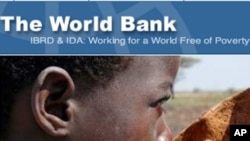The World Development Indicators 2010 has been released by the World Bank and shows that all regions except sub-Saharan Africa are on track to meet the poverty reduction target.
World Development Indicators program manager Eric Swanson says this year's report from the World Bank shows progress is being made to fight poverty in poor and middle-income countries around the world.
"Progress started very slowly in the first part of the new millennium and many of the targets that were collected were very ambitious," Swanson said. "But we have seen an acceleration, more countries on track to reach the targets individually and globally the averages are starting to look better."
This year's World Development Indicators focuses on the Millennium Development Goals, which are now in their 10th year.
The eight Millennium Development Goals are targets to fight poverty, hunger, and disease by 2015.
Some regions are already reaching those targets, says Swanson. In education, 50 countries have already reached the target to educate every child at least through primary school. And poverty is reducing at a rapid pace - particularly in Asia.
But in each of the eight categories, sub-Saharan Africa lags behind. Child mortality remains high, as does maternal mortality, HIV and malaria continues to spread, and the percentage of children in education is still lower than any other region in the world.
Swanson says sub-Saharan Africa faces a number of obstacles.
"You have had a decade or more in Africa of very slow economic progress in the nineties," Swanson said. "You have had civil war and other disruptions, you have had poor governance in many countries that has not allowed the economy to grow and, in particular, has not allowed poor people to share in the benefits of growth."
But he says progress is being made. In Eritrea and Malawi child mortality has fallen sharply.
"I think that shows that it is possible to make progress in Africa in spite of obstacles," Swanson said. "Malawi is a landlocked state, it is one of the ones we tend to worry most about, and yet it has demonstrated that when you focus attention on a problem you can make progress."
Jasmine Burnley, a policy advisor for the Britain-based charity Oxfam, says the biggest obstacle to meeting the Millennium Development Goals is finance. She says unfair trade agreements and subsidies given by rich countries to their own agriculture sectors stifle Africa's economy.
"There are overall economic reforms which need to be made to help Africa get closer to the Millennium Development Goals, but a lot of it is about the financing," Burnley said.
The Organization for Economic Cooperation and Development said last week that international donors are failing to meet their aid targets - and as a result Africa has received less than half the extra aid it has been promised.
Report: Africa Not on Track to Meet Poverty Targets
- By Diaa Bekheet





